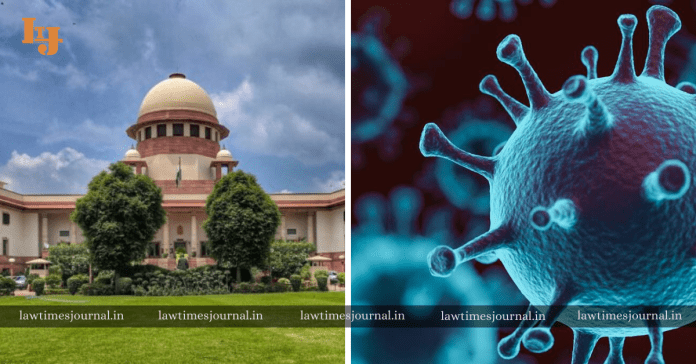Due to Corona pandemic Supreme Court on 06th April, 2020 issues slew of Guidelines for Hearings through Video Conferencing. SC Guidelines were issued Suo Moto and Cognizance of a letter filed by senior advocate and former SCBA – Supreme Court Bar Association President Vikas Singh. Petitioner Singh suggested measures of using the technology for conducting hearings in the courts after Corona lock down. Petitioner told the Bench that there is a possibility that lockdown may end on April 15, but the Apex court would have to consider ‘how the courts would function post lockdown’.
The Supreme Court Bench, comprising CJI Bobde, Justice D Y Chandrachud and Justice L Nageswara Rao, hearing the petition of Petitioner, directed to extensively use video-conferencing for Judicial Proceedings. Furthur Court saying Congregation of lawyers and litigants must be suspended to maintain Social Distancing amid Corona Pandemic. Due to Corona Pandemic lockdown, the Bench is hearing extremely urgent matters through video conferencing, which includes Bail Cases and pleas related to Hardship faced by migrant workers
The Petitioner said, “there is a need to see how litigants and lawyers appear before the court and there is a need to take a call on creating a system, which would work post lockdown”. In response, SC Bench said “We will not hear this till an announcement from government on the lockdown is made. If the lockdown is lifted, we will hear the matter, if it is not lifted, we will see what can be done,”
Bench headed by Chief Justice S A Bobde said that Corona Pandemic has Necessitated Social Distancing and Court Premises do not contribute to the spread of Corona stressing that “technology is here to stay”
The Apex Court made it clear that ‘if recording of evidence is must in the courts, no evidence would be recorded via video-conferencing’, then the concerned judge would ensure that social distance is maintained inside the courtroom. The Bench said that ‘no presiding officer would restrict the entry of parties to the case unless they are having any health problem’.
SC Bench given the following Guidelines on Video Conferencing
- The Apex Court observed, though Indian Courts is using technology to provide access to courts, the Supreme Court took measures to get legal protection under Article 142 to Direct all the High Courts to Frame a Mechanism for use of technology during the pandemic.
- For smooth functioning of Courts, every stakeholder is expected to coordinate during this “unprecedented and extraordinary” Outbreak of Covid-19
- The Bench said it is “not a matter of discretion but of duty” to ensure that the Court Premises do not contribute to the spread of virus and courts must take all measures to ensure guidelines on Social Distancing and Public Health are followed.
- Apex Court asked the NIC – National Informatics Centre and Department of Justice to take note of the problems, which the Apex Court had faced on April 3, Connectivity issue during court hearing through Video Conferencing.
- Supreme Court stated that, Video Conferencing and its Modalities are the important steps to ensure Rule of Law and Preserve the Constitution, it is important to perpetuate social distancing in light of the Covid 19 Pandemic.
Supreme Court Guidelines on Subordinate Courts regarding Video Conferencing
- District Courts to adopt Video Conferencing in accordance with respective High Court Rules, until High Courts frame rules no evidence can be recorded unless agreed to by both parties
- Sub Ordinate Courts will have to make arrangements for litigants, who don’t have access to Video Conferencing Technology
- Evidence cannot be recorded through Video Conferencing till High Courts frame some detailed rules on this. This will have to be done in a Court Room, where Social Distancing measures have to be taken by the Presiding Officer
- High Courts have Discretion to choose which Application / Software to be used in Video Conferencing. Officials of the NIC to assist High Courts for setting up Video Conferencing systems
- Those litigants who do not have access to video conferencing facilities can use High Court’s video conferencing until appropriate rules are framed
- Supreme Court Bench ordered that a limitation perioed under the general law or special Laws whether Condonable or Not shall stand extended from 15th March 2020 till further orders
- Bench Said, ‘Courts to maintain helpline for grievances of video feed and line during and immediately after the hearing’
- The Apex Court said for litigants who cannot access to Video Conferencing facilities to conduct hearings until High Courts frame appropriate guidelines on Video Conferencing
Conclusion
After hearing the petition filed by Petitioner, Supreme Court Bench Adjourned for four weeks till 14th April, 2020, for more clarity on status of lock-out. Bench asked Secretary General, Registrar General of all the High Courts and Director General of NIC – National Informatics Centre to coordinate on Video Conferencing and observed, “This cannot be seen as a temporary issue. Technology is here to stay”
Edited by Pragash Boopal
Approved & Published – Sakshi Raje







